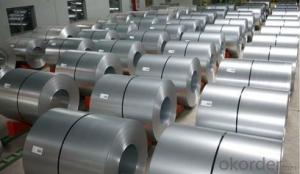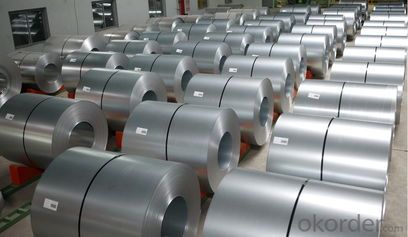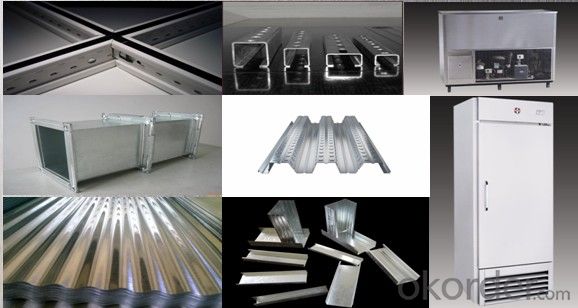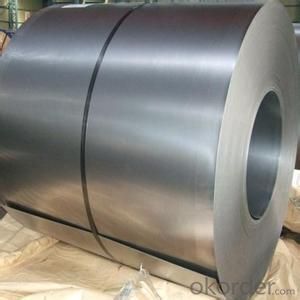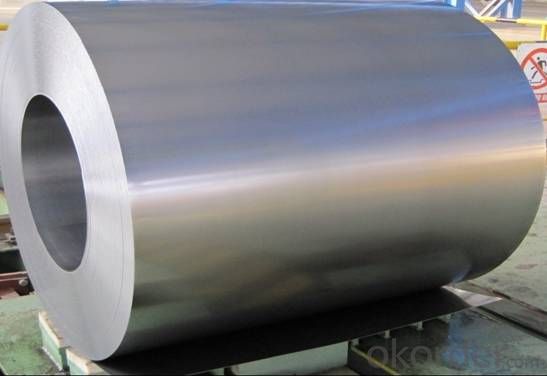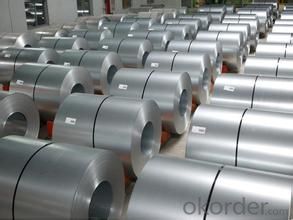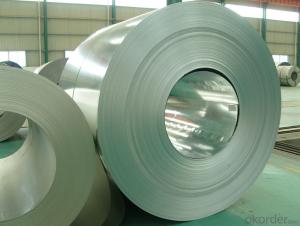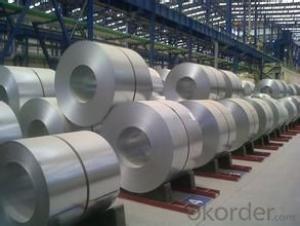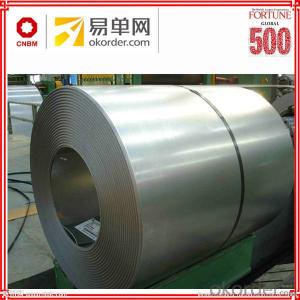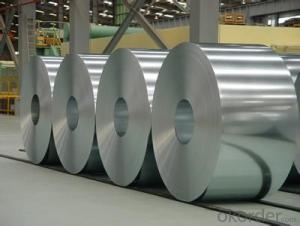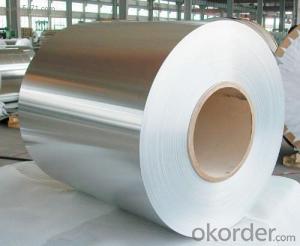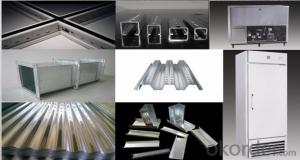Hot-dip Zinc Coating Steel Building Roof Walls- Every Size in Low Price
- Loading Port:
- China main port
- Payment Terms:
- TT OR LC
- Min Order Qty:
- 50 m.t.
- Supply Capability:
- 10000 m.t./month
OKorder Service Pledge
OKorder Financial Service
You Might Also Like
Hot-dip Zinc Coating Steel Building Roof Walls- Every Size in Low Price
1.Structure of Hot-Dip Galvanized Steel Sheet Description:
Hot-dip galvanized steel coils are available with a pure zinc coating through the hot-dip galvanizing process. It offers the economy, strength and formability of steel combined with the corrosion resistance of zinc. The hot-dip process is the process by which steel gets coated in layers of zinc to protect against rust. It is especially useful for countless outdoor and industrial applications. Production of cold formed corrugated sheets and profiles for roofing, cladding, decking, tiles, sandwich walls, rainwater protective systems, air conditioning duct as well as electrical appliances and engineering.
2.Main Features of the Hot-Dip Galvanized Steel Sheet:
• Excellent process capability
• Smooth and flat surface
• Workability, durability
• Excellent anticorrosive property
• High strength
• Good formability
• Good visual effect
3.Hot-Dip Galvanized Steel Sheet Images
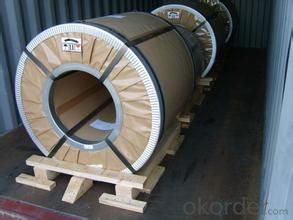
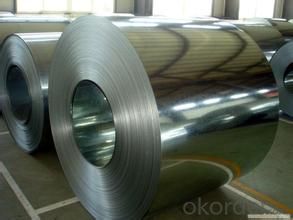
4.Hot-Dip Galvanized Steel Sheet Specification
Standard: ASTM, JIS,EN
Grade: CS, DX51D+Z,SGCC, SS 230~550,S220GD+Z~S550GD+Z, SGC340~SGC570
Thickness: 0.18mm~5mm
Width: max 2000mm
Coil weight:3-12 MT
Coil ID:508/610mm
Surface structure: zero spangle, regular spangle or minimum spangle
Surface treatment: Chromate treatment, Oiled/dry, skinpassed/non-skinpassed
Packing: Standard seaworthy export package
Technology test results:
Processability | Yield strength | Tensile strength | Elongation % | 180°cold-bending |
Common PV | - | 270-500 | - | d=0,intact,no zinc removal |
Mechanical interlocking JY | - | 270-500 | - | d=0,intact,no zinc removal |
Structure JG | >=240 | >=370 | >=18 | d=0,intact,no zinc removal |
Deep drawn SC | - | 270-380 | >=30 | d=0,intact,no zinc removal |
EDDQ SC | - | 270-380 | >=30 | d=0,intact,no zinc removal |
5.FAQ of Hot-Dip Galvanized Steel Sheet
We have organized several common questions for our clients,may help you sincerely:
1.How to guarantee the quality of the products?
We have established the international advanced quality management system,every link from raw material to final product we have strict quality test;We resolutely put an end to unqualified products flowing into the market. At the same time, we will provide necessary follow-up service assurance.
2. How long can we receive the product after purchase?
Usually within thirty working days after receiving buyer’s advance payment or LC. We will arrange the factory manufacturing as soon as possible. The cargo readiness usually takes 15-30 days, but the shipment will depend on the vessel situation.
- Q: What are they worth today? As well as a 1943 steel nickel?
- The 1943 zinc coated steel cent is very common in circulated grades. They were saved by a lot of people because they are a one year type coin. I can buy them for .02 to .10 each depending on grade. Uncirculated ones are worth more, a few dollars. There is no such thing as a 1943 steel nickel. The nickel that year were made of 56% copper,35% silver and 9% manganese. The 1943 nickel sells for around a $1 in very fine to $2 in extra fine. It is worth more in high grade mint state.
- Q: benchmade mpr with m390 steel knife. Is it better than d2 s30v or 154cm steel?
- From what I understand m390 is a new steel (at least for benchmade) so there doesn't seem to be a consensus on how it performs. Looking at the table, it should be very corrosion resistant. I'd guess it could be classified as a stainless steel. Sorry I don't have more info for you. EDIT: here's a link from the steel manufacturer. I hope this info helps.
- Q: What are the safety regulations for handling steel coils?
- The safety regulations for handling steel coils include wearing appropriate personal protective equipment, such as gloves and steel-toed boots, using proper lifting techniques and equipment, ensuring a clear and organized work area, and following guidelines for stacking and securing coils to prevent accidents and injuries. Regular inspections and maintenance of equipment and storage areas are also crucial for ensuring safe handling of steel coils.
- Q: What are the common methods of joining steel coils?
- There are several common methods used for joining steel coils, depending on the specific application and desired outcome. 1. Butt welding: This is a commonly used method where the two ends of the steel coils are aligned and welded together. Butt welding can be done using various techniques such as gas welding, electric resistance welding, or laser welding. This results in a strong and continuous joint without any additional material. 2. Overlapping and stitching: In this method, one end of the steel coil is overlapped onto the other end, and then stitched together using mechanical fasteners like staples, nails, or screws. This technique is suitable for temporary or low-stress applications where disassembly may be required. 3. Mechanical coupling: Steel coils can also be joined using mechanical couplings. These couplings are typically designed to fit over the ends of the coils and securely hold them together. Mechanical couplings are commonly used in pipelines, where the joint needs to be leak-proof and withstand high pressure. 4. Adhesive bonding: Another method of joining steel coils is through the use of adhesives. This involves applying a suitable adhesive or bonding agent to the ends of the coils and then pressing them together. Adhesive bonding allows for a clean and aesthetically pleasing joint, but its strength may vary depending on the adhesive used. 5. Overlapping and welding: Similar to overlapping and stitching, this method involves overlapping the ends of the steel coils and then welding them together. However, instead of using mechanical fasteners, welding is used to create a stronger and more permanent joint. This method is commonly used in structural applications where high strength and durability are required. It is important to note that the choice of joining method depends on factors such as the type of steel, the application requirements, and the desired strength of the joint. Proper consideration should be given to ensure the selected method is suitable for the specific project.
- Q: How do steel coils contribute to energy efficiency in transportation?
- Steel coils are essential in energy-efficient transportation due to their lightweight yet strong nature. The use of steel coils in vehicles, such as cars and trucks, reduces the overall weight of the vehicle, enhancing fuel efficiency and reducing carbon emissions. Additionally, steel coils are often used in rail transportation, where their durability and strength contribute to the energy efficiency of trains by allowing for higher speeds and improved load carrying capacity.
- Q: Does the solution change, or does only the steel wool change color?
- once you upload water to anhydrous copper(II) sulphate it turns blue because of the fact that's going to become hydrous copper(II) sulphate. Then, in case you upload water greater, that's going to proceed to be blue, could be slightly darker.
- Q: What are the common methods of painting or coating steel coils?
- One common method of painting or coating steel coils is through the process of coil coating. In coil coating, the steel coils are first cleaned and pre-treated to remove any contaminants and improve adhesion. Then, a primer or a base coat is applied to the coils to provide a foundation for the final coating. This primer helps in protecting the steel from corrosion and improves the overall durability of the coating. After the primer is applied, the steel coils pass through a series of rollers where the topcoat is applied. The topcoat can be a variety of materials such as polyester, polyurethane, or fluoropolymer, depending on the desired properties of the final coating. These topcoats provide the desired color, gloss, and protection against weathering, chemical exposure, and UV radiation. Another common method of painting or coating steel coils is through the process of electrostatic spraying. In this method, a paint or coating material is atomized into fine droplets and then charged with an electrical charge. The steel coils, which are grounded, attract the charged droplets, resulting in an even and controlled application of the paint or coating material. Powder coating is yet another method used for painting or coating steel coils. In this process, a dry powder is electrostatically charged and sprayed onto the steel coils. The charged powder adheres to the surface of the steel due to electrostatic attraction. The coated steel coils are then heated, causing the powder to melt and form a continuous film, providing a durable and resistant coating. Overall, these methods of painting or coating steel coils offer a wide range of options in terms of color, finish, and performance characteristics. The choice of method depends on factors such as the desired appearance, level of protection needed, and the specific requirements of the intended application.
- Q: I was wondering what kind of company casts and sells steel without acting as a contractor as well. They only sell steel no install it
- If you are talking about raw steel materials and products I believe you are talking about a steel processor and warehouse company or a steel distributor. There are many different points along the steel manufacturing process that you could buy steel products. It would depend on various factors. Depending the amount, type, grade, gauge, properties, origin and a host of other elements you could purchase the steel in billet, plate, diamond plate, rolled sheet (cold or hot), coil, beam, stamped, pickled, scrapped, etc. You get the idea. Now I don't know where you are in the world, but you can go to one of the two sites below, which I have used for product sourcing and research before. The last one is a major manufacturer that I have actually been to. I hope this helps.
- Q: How are steel coils used in the production of wire products?
- Wire products rely heavily on steel coils, which are indispensable in their production. These coils, typically crafted from high-quality steel, serve as raw materials in wire drawing processes. Wire drawing, a manufacturing technique, diminishes the coil's diameter, converting it into diverse wire products. The initial step involves the placement of a steel coil onto a wire drawing machine. Subsequently, the machine pulls the coil through a sequence of progressively smaller dies. Each die the coil passes through reduces the wire's diameter, resulting in a more slender and elongated wire strand. This process can be repeated multiple times until the desired wire thickness is achieved. Once the wire is drawn, it can undergo further processing to create an array of wire products, including fencing, nails, screws, springs, and electrical wires. The wire can be cut into specific lengths, bent, or shaped to suit its intended purpose. Moreover, it can undergo treatments like galvanizing or coating to enhance its durability and resistance to corrosion. Steel coils offer numerous advantages in wire product manufacturing. Firstly, they provide a consistent and uniform material, ensuring the resulting wire products possess consistent quality and performance. Secondly, steel coils are easily transportable and can be stored efficiently, making them a cost-effective choice for manufacturers. Lastly, the versatility of steel enables the production of wire products with varying tensile strengths and properties to meet specific industry requirements. To summarize, steel coils play an essential role in wire product manufacturing. They serve as the primary raw material in wire drawing processes, where they undergo a series of reduction steps to be transformed into diverse wire products. These wire products find applications across various industries, solidifying the indispensability of steel coils in the manufacturing sector.
Send your message to us
Hot-dip Zinc Coating Steel Building Roof Walls- Every Size in Low Price
- Loading Port:
- China main port
- Payment Terms:
- TT OR LC
- Min Order Qty:
- 50 m.t.
- Supply Capability:
- 10000 m.t./month
OKorder Service Pledge
OKorder Financial Service
Similar products
Hot products
Hot Searches
Related keywords
